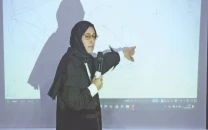TV’s monopoly as a medium is about to end: Nadeem Baig
Ace film-maker among others spoke about hurdles, possibilities at Karachi Theatre Festival

It has almost become a cliché to slam local TV and by extension the film industry for a lack of innovation and not giving opportunities based on some sort of merit. For decades there has been a lot of discourse on the quality of content going into a stalemate due to lack of risk-taking on the part of the powers that be. That same risk averseness has also extended towards the hiring of performance artists, in the sense that trained actors are often moved aside in favour of those that with no know-how of the craft.
Such debates have usually ended up with either the participants reminiscing about a long lost ‘glory’ that may or may not have existed. Or it would end on a false optimism that is not even clearly thought out. The colloquial term to describe the nature of such discussions would be ‘vanilla’.
For a change, a panel discussion was carried out at the Arts Council that shared the myopic state of affairs in regard to TV without any sugar coating and sense of false nostalgia. Dubbed ‘Can Theatre Help Regain TV/Film's Lost Glory?’ the discussion focused more on the systematic apartheid against theatre actors.
Actor Yasir Hussain and writer Mohsin Ali both of whom came from a theatre background, shed light on how a jump into TV is seen as an economic necessity. “Survival in theatre is very difficult. I was lucky enough to have a stint in commercial theatre. But for most of us, including me, the jump towards TV is because financial stability is close to impossible in theatre. If theatre artists were paid better and there was a framework in place to ensure their wellbeing, I wouldn’t have jumped to TV,” Hussain said.
On the stigma against theatre artists in the mainstream, Hussain was of the opinion that directors and producers who actually want progress should take a stand. “The directors who have earned a certain stature and by extension say in the industry really need to speak up for the ignored-yet-talented lot. If theatre artists can do well in India they can do well here,” he said.
Ali while acknowledging that he was lucky in some ways when he branched out to TV as a writer, stressed that in most cases the cards are stacked against theatre artists. “The hurdles for theatre artists in terms of breaking into the mainstream would remain the same for the next 20 years. Given my age at this point, I don’t see the point in giving anyone including myself false hope,” he said.
“If you talk about my struggle, I have been lucky enough to work with directors that have explained the shift in medium-well. But generally, it’s very hard. The failure rate is 98%,” Ali said.
TV and film powerhouse Nadeem Baig stepped in to admit the systematic failure on part of the TV industry. “I think that it’s very sad that we couldn’t create opportunities for these (theatre) actors. There is a lot of involvement from the management side that makes it difficult to cast certain actors,” Jawani Phir Nahi Aani director told the audience. “But I think TV’s aristocracy is about to end soon. In the next few years you might see theatre artists that are crossing over to TV, in more, prominent roles.”
Namaloom Afraad director, Nabeel Qureshi talked about how being in a creative supervisory line of work, he feels a sense of responsibility towards uplifting theatre artists. “I always try to give back to theatre by casting theatre actors in my films. As a theatre actor, you don’t have much of a choice than transitioning into film and making a name for yourself,” he said.
Qureshi also acknowledged that getting more theatre actors into his film isn’t a completely altruistic affair. According to the director, trained theatre actors make the film-making process smoother and faster. “It’s easier if I work with a trained actor from theatre. I understand the medium is different but at least a trained actor, be it from anywhere would have some know how. It takes less time to work with them,”
Have something to add to the story? Share in the comments below.



















COMMENTS
Comments are moderated and generally will be posted if they are on-topic and not abusive.
For more information, please see our Comments FAQ